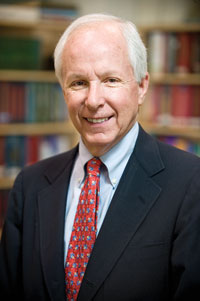Pioneering ethicist makes an enduring mark
If ever there was a gnarly ethical trail to blaze, it’s the one that wends through modern biomedical science.
In the dark corners of medicine, life-and-death decisions are more common than we know. Knotty ethical conundrums such as stem cell research, removing life support from terminally ill children and managing the care of cancer-stricken patients whose lives may — or, more likely, may not — be saved by administering toxic drugs and body-wasting radiation constitute a heavy routine.
But medical ethics in the United States and, increasingly, around the world does have guideposts, planted by a few trailblazers with the courage to make hard decisions and live with the consequences. In many respects, UW–Madison pediatrician Norm Fost is the Daniel Boone of modern medical ethics.
In the late 1990s, for example, Fost and colleague Alta Charo, at the request of developmental biologist Jamie Thomson, helped forge the ethical parameters of research with human embryonic stem cells, providing an ethics blueprint for deriving and working with the controversial cells. As erstwhile chair of one of UW–Madison’s key institutional review boards (IRB), the panels that govern human subjects research, Fost worked hand-in-hand with R. Timothy Mulcahy, former Graduate School associate dean to help the university successfully navigate a period of intense federal scrutiny in the mid-1990s. It was a time when the government was busy shuttering famed biomedical research programs at Duke and Johns Hopkins universities for alleged lax oversight of human subjects research.
“They were shutting down universities left and right. It was a reign of terror,” recalls Fost, who this year wrapped up 30 years as chair of the UW–Madison Health Sciences IRB.
Instead of a rap on the knuckles or worse, the feds patted Wisconsin’s Health Sciences IRB on the back, cited it as a model and tried to raid its staff.
Fost can also play the bioethics contrarian. His take on performance-enhancing drug use by professional athletes, for instance, is that the playing field should be leveled by permitting their open use. He labels efforts by Congress and others to investigate steroid use by professional athletes as little more than a benighted reincarnation of the reefer madness frenzy that gripped American society in the 1930s.
“No one tries to promote controversy, but sometimes when you express your opinion, that happens,” says Phil Farrell, former dean of the School of Medicine and Public Health.
“He has very strong views and is willing to express them,” adds Charo, a law professor who was Fost’s colleague in medical ethics and on the Health Sciences IRB. “We’ve had some battles royal.”
There is perhaps no more acute setting for argument than an institutional review board at a place like UW–Madison. With about 2,000 active studies involving tens of thousands of participants, the scope of human subjects research here is rivaled by few other institutions. And as a font of new and sometimes radical biomedical intervention, the ability to test new ideas on humans is essential.
“It is of fundamental importance,” notes Fost. “You can’t develop new technologies if you don’t study them in people. That’s how we know something is ready for prime time.”
Sometimes, trials — and their oversight by an IRB — are literal life-or-death matters: “I’m not scared by high risk research,” Fost asserts. “We’ve authorized the administration of drugs and radiation that we know are going to kill a certain percentage of patients. The parameters are well known. What’s quite remarkable, is how few unanticipated deaths occur nationwide. I think the system works.”
It works at Wisconsin, says Charo, in good measure because of the qualities Fost brought to the conversation.
“He is a highly directive leader,” explains Charo. “And he has passion. You can be as smart as Einstein and as diligent as anybody in the world and you still may not be able to inspire people about this subject and get them to devote their time to this work.”
Farrell uses the words integrity and courage when asked to describe Fost and his accomplishments: “I knew Norm had courage right from the beginning. To decide, for example, to withdraw life support from a newborn baby is a real tough decision, but Norm helped me with such decisions when I was a practicing neonatologist.”
Such dilemmas must have been especially hard for Fost, who, Charo says, tends to take a special interest in children.
“By virtue of being a pediatrician, I think he is extremely cautious when it comes to research with children,” she says. “He looks particularly hard as to whether there is some prospect of individual benefit to children enrolled.”
As an academic, Fost also helped lay the foundation for one of the nation’s first and best programs in medical ethics. He was trained in medicine at a time when biomedical ethical conundrums were rarely part of the curriculum, and he’s helped Wisconsin fill that void.
“There was one guy at Yale Law School, Jay Katz, who taught a course in the medical school on ethical and legal questions,” Fost recollects of his medical training at Yale. “That was the model I needed. He showed me it was possible to have this kind of career.”
Tags: bioethics, faculty, philosophy





